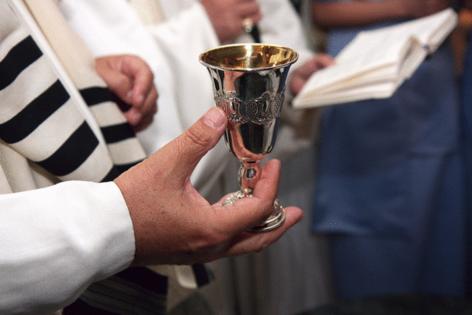Commentary: After the surgeon general's warning on alcohol, people of faith should rethink sacramental wine
Published in Op Eds
I grew up seeing wine as a symbol of joy, holiness and a tool for elevating the mundane. From the weekly Kiddush (a blessing said over a wine cup) on Shabbat to holidays like Purim, Passover and Simchat Torah, wine occupies a sacred space in Judaism.
But this month, the surgeon general’s advisory on alcohol’s link to cancer has shaken me. It reminded me that even cherished traditions carry risks we must confront.
The advisory states that alcohol consumption, even in moderate amounts, is linked to multiple cancers, including breast, liver and esophageal cancer. For years, the narrative was that alcohol was harmful only in excess. Now we are told that there could be grave risk even in temperate consumption. As a father of four and a member of a community that celebrates with wine and hard liquor, I can’t look away from this warning.
Alcohol’s role in Judaism has always been distinct. In contrast to some religions, like Islam, that prohibit it, Jewish tradition embraces it as a means of fostering joy, connection and spirituality. The Talmud teaches, “There is no joy without wine,” and the mystical Zohar suggests that wine can reveal hidden truths.
For Chabad Hasidim, in which joy is paramount, alcohol has often played a role in communal gatherings called farbrengens. Recognizing its dangers, the movement’s leader, the Rebbe, explicitly forbade excessive drinking in 1962.
But even the embrace of moderate alcohol in holy contexts demands scrutiny in light of what scientists are now finding. Cancer doesn’t care about intention. A glass of wine lifted during Kiddush to sanctify the Sabbath carries the same risks as one raised in a bar. And while the Torah commands us to protect our health, it’s easy to lose sight of this when tradition feels unassailable.
Certainly sober people in Jewish communities have found ways around alcohol consumption, and the rest of us could look to their leadership. Jewish law even explicitly allows grape juice to be used in place of wine for rituals such as Kiddush and the four cups at the Passover seder. Using grape juice preserves the holiness without the health risks of alcohol.
Christian communities face similar concerns with Communion wine, which represents the blood of Christ. Many Protestant churches offer grape juice instead of wine, addressing health risks and accommodating people who avoid alcohol for any other reason.
Advisories like the recent one from the Office of the Surgeon General helped slash smoking rates from 42% in 1965 to under 12% today. And although past advisories on low-fat diets underestimated the dangers of sugar and refined carbohydrates, and early COVID-19 mask guidance failed to address asymptomatic transmission, in each case, as more data came to light, guidance improved — much as the government’s guidance about alcohol consumption has now improved. Such evolution shows successes of science, not failures.
Even if moderate drinking is considered safe, in reality it doesn’t always remain moderate or safe. I’ve seen spiritual gatherings at which participants sing melodies and share stories and insights over drinks. What starts as a few small toasts for inspiration can, for some, lead to unhealthy patterns. And while most people are careful, my Chabad community, and society in general, still normalize alcohol in concerning ways — and leave little space for questioning that normalization. The surgeon general’s report reminds religious people that we should not hide behind the veil of tradition when the expansion of human knowledge sheds new light.
As a father, I find this deeply personal. When I lift a cup of wine during Kiddush in front of my children, am I normalizing something harmful? We must hold on to the holiness of our rituals while mitigating their risks.
Judaism has always embraced that balance. The Talmud warns against drunkenness, and Maimonides teaches that true joy comes from wisdom and balance, not overindulgence.
Perhaps it’s time to expand the conversation. What if we made Kiddush more often with nonalcoholic options like grape juice? What if we toast “L’chaim” over mocktails instead of cocktails?
Judaism is an ancient and thriving faith, and one key to this endurance has been a willingness to adapt traditional practices to reflect modern realities, while holding fast to our values. In matrimonial law, for example, rabbis developed protective prenuptial agreements so that a woman could not end up unable to remarry if her first husband wanted to prevent a divorce. Similarly, the sanctity of wine and alcohol must never overshadow the sanctity of life.
I admit, I carry a sense of vindication when reflecting on my late father, whose criticism of Hasidic Judaism stemmed, in part, from its embrace of alcohol. At farbrengens, he shunned vodka, and his disapproval was especially strong when minors had access and drank. His defiance planted a seed in me to honor his belief that holiness must never come at the expense of health or truth.
The glass may still be half full, but the power to decide its meaning is entirely ours. Let’s choose wisely.
____
Eli Federman often writes on the intersection of religion and society. X:@EliFederman
___
©2025 Los Angeles Times. Visit at latimes.com. Distributed by Tribune Content Agency, LLC.




























































Comments